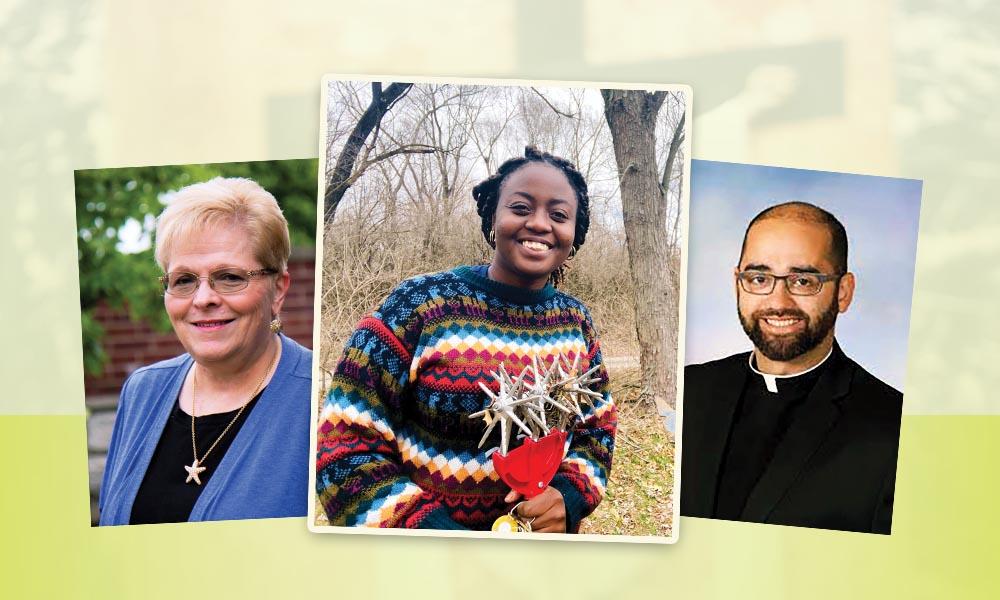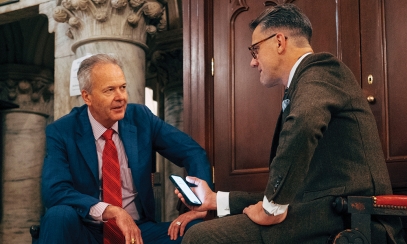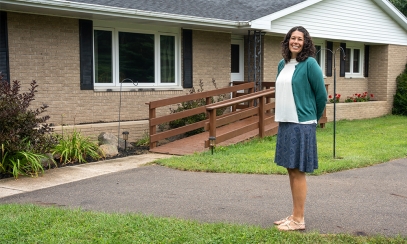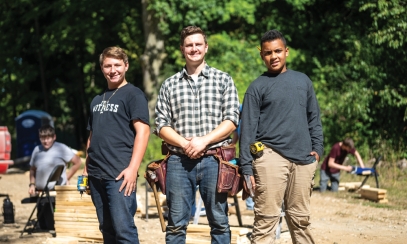
Three Movements, Five Words: Catechesis, Evangelization, Faith Into Action
FROM THE EDITOR: Inspired by Bishop Ronald Hicks’ vision for the diocese — see his column on pages two and three in English and Spanish — the magazine shares with you three people who offer their insights into what catechesis, evangelization and faith into action mean to them.
Catechesis
Catechesis, from the Greek “echoing the faith,” is the formal name for how the Catholic Church passes on the teachings of Jesus to succeeding generations. Catechesis is not just classes for children and teens but lifelong formation and growth in discipleship for people of all ages.
Catechesis is for everyone: Did you know you have personal responsibility to grow in maturity in the faith you received at baptism? (Directory for Catechesis, 259.) By engaging in lifelong catechesis, you can follow Jesus more faithfully as your life unfolds.
Catechesis of children begins in the home. The parish or school never replaces the primary role of parents as first catechists of their children: “Believing parents, with their daily example of life, have the most effective capacity to transmit the beauty of the Christian faith to their children.” (Directory for Catechesis, 124) This is why some parishes in the Diocese of Joliet offer family catechesis or parent formation. Adult catechesis equips people to be witnesses of faith for their families and community.
Those who catechize are called catechists. Whether in the home, a parish or Catholic school, a catechist “must be a witness to the faith, a teacher and a mystagogue, a companion and pedagogue…” (Pope Francis, Antiquum Mysterium, 6). That means knowing how to connect Church teaching to personal experiences of finding God in everyday life and in the sacraments and using age-appropriate teaching methods to invite the learners to make connections.
The Church recognizes that teaching Catholic doctrine without fostering a relationship with Jesus or connections to lived experiences has not been effective in keeping young people Catholic. Good catechesis always leads to Jesus.
“The definitive aim of catechesis is to put people not only in touch, but also in communion and intimacy, with Jesus Christ” (General Directory for Catechesis, 80).
Catechesis is a dialogue in which the culture and developmental needs of those who are learning must be considered. Parishes or schools should provide opportunities to encounter Jesus through Scripture, liturgy, prayer, and service, facilitated by catechists who can break the experiences open to reveal Jesus. When this is done well, doctrine has a living context for faith to grow.
Catechesis is a prime opportunity for ongoing evangelization — for deepening a personal relationship between the learner and Jesus. The catechist does this by continually proclaiming the Good News:
On the lips of the catechist the first proclamation must ring out over and over: “Jesus Christ loves you; He gave His life to save you; and now He is living at your side every day to enlighten, strengthen and free you.” This first proclamation is called “first,” not because it exists at the beginning and can then be forgotten or replaced by other more important things. It is first in a qualitative sense because it is the principal proclamation, the one which we must hear again and again in different ways, the one which we must announce one way or another throughout the process of catechesis, at every level and moment (Evangelium Gaudium, 164).
What Is Evangelization?
The Greek word euangelion (in Latin, evangelium) means “good news.” Evangelization stems from these words, and to announce the Good News means one is sharing with others the Gospel message that we have a redeemer, Jesus Christ, whose life, death and resurrection pave the way for our salvation.
Father Michael Kearney, formator and spiritual director at St. John Vianney Seminary in St. Paul, Minnesota, was a missionary for the Fellowship of Catholic University Students for six years and has a heart for evangelization. Carlos Briceño recently interviewed him on what evangelization means. Here are his answers:
How would you define evangelization?
Evangelization to me is about bringing people into a way of life through friendships. Jesus said, “I am the Way, the Truth and the Life.” You also read about the early Church in the Acts of the Apostles [see Acts 9:2; 18:25; and 19:9] of people coming into the Way. Christianity is a way of life, which includes a way of relationship.
In several of St. Paul’s letters, he will include a list of salutations to people with whom he had deep friendships as a result of his missionary journeys and life of evangelization. We read in 2nd Timothy, when St. Paul is about to die, the importance of these missionary friendships: “Luke is the only one with me. Get Mark and bring him with you, for he is helpful to me in the ministry” (2 Timothy 4:11).
Leading to the point of his death, St. Paul calls for his friends whom he met through mission. We have two Gospel writers, Luke and Mark, but we see him writing letters to Timothy and Titus also. St. Paul, who gave us two-thirds of the New Testament, also impacted the Gospel writers and leaders of the early Church by investing his very life into them. This reveals that evangelization is more than just sharing the Gospel, but our very self.
In my work, I have encountered people excited about evangelization. They have the desire to share the Good News of Jesus Christ but fail to realize the necessary part of evangelization: our very self and deep friendships. Their mistake is that they just say, “All I have to do is talk about Jesus.” They miss the point that evangelization is inviting people into a way of life, a way of relationship.
St. Paul writes in 1 Thessalonians 2:8, “With such affection for you, we were determined to share with you not only the Gospel of God, but our very selves as well, so dearly beloved had you become to us.” There is something powerful in that statement. Evangelization involves sharing the Gospel and your life; there is no separation.
For me, evangelization was always based on inviting people into my life and, from that friendship, inviting them into a life with Christ. This process involved more than one encounter, but time spent over months or even years.
Isn’t being a disciple first an important first step in evangelizing others?
That’s a foundational part, and so learning the faith through catechesis and giving our lives over to Christ is important. You should be committed to the Lord, following the Lord, which includes [time for] prayer, commitment to the sacraments, and growing in faith.
Is there anything you want to add?
Just to re-emphasize, evangelization involves sharing your very self. Can we, and are we willing to, let people into our lives, in order to share the Good News of Jesus Christ?
Putting Faith into Action
Nia White is director of Jordan River Farm, which is a service retreat center and community garden of the Diocese of Joliet’s Laudato Si’ Ministries. It is a live-in intentional Catholic community that hosts retreats for volunteer groups that do service projects in Pembroke Township. This area, in the southern part of the diocese, is poor, one of the poorest in the state. For instance, some homes don’t have plumbing or sewage. Carlos Briceño recently spoke to Nia to ask her how she defines faith in action.
What do you do?
At Jordan River Farm, we have a garden that consists of about 20 beds that will produce fruits, herbs, and vegetables. Our goal is that whatever we grow we serve the community, especially here at our church, Sacred Heart Mission Church. We offer service projects in the community. Groups can come out and serve on these projects, which [range] from painting a deck or filling someone’s utility room with rocks so that they have a solid floor or building a garden.
In short, we are here for the people of Pembroke and Hopkins Park. We’re advocates for them. We’re a source of knowledge for them. We offer a summer program, which is every Tuesday, for kids within the community where they can learn how to care for the Earth and sustain themselves with the food they grow. The kids can learn how to identify birds. They can learn about their community or the significance of all the trees that are indigenous to Pembroke Township and Hopkins Park.
How do you define faith into action?
Doing what you believe through your actions. If I believe something, if I believe that God gave us this Earth, then I have to show it in all my actions. I have to show it by not throwing garbage on the ground or by giving compassion for the people who live on it.
Can you share a short anecdote that illustrates your faith and love of God in action?
In Matthew 18, we are told to become childlike. Often here at Jordan River Farm, I can be hyperfocused on the work portion of the farm. I will often feel like I have to always be busy and completing a task.
One day, one of the children in the town came by and began to ask us many questions. All of his questions were pertaining to the environment around us. What is that bird? How do you plant seeds? Can you see that nest? Do you think the mother is nearby?
Before, I would see the farm as a place where I have to complete checklists and obligations. His questioning made me look at the farm as a place of beauty and great ecological potential. I had to stop seeing Jordan River Farm as the director and use the inquisitive mind of a child. This has made my time here at Jordan River far more enjoyable. I notice more. In a way, I actually feel closer to the Earth around me. This way of thinking and seeing has also made me not as upset when the deer eat our produce.
Is there anything you want to add about faith into action?
The most important thing for people is, one, to define it for yourself, and, two, put your faith into action and share it with the world. I don’t think that is something we should keep to ourselves. It should be something we should share with others. Think of faith in action as gift.



